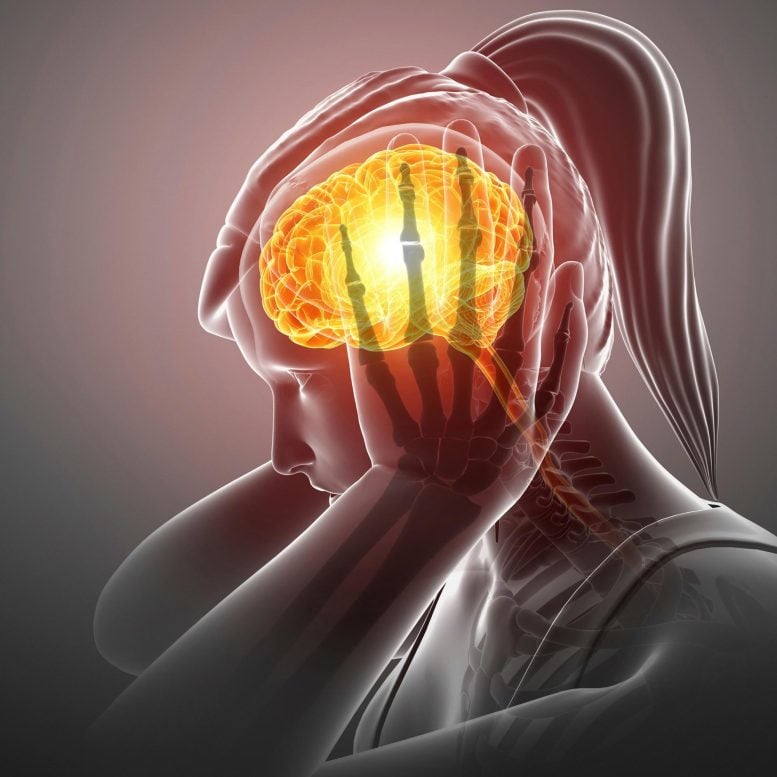
A study published in Neurology finds that high diastolic blood pressure slightly increases the odds of migraines in women.
The research involved 7,266 participants and showed no similar risk for systolic blood pressure or male participants. These findings suggest small blood vessel function might be linked to migraines.
Link Between High Diastolic Blood Pressure and Migraine
Having high blood pressure, specifically high diastolic blood pressure, was linked to a slightly higher odds of ever having migraine in female participants, according to a new study published today in the July 31, 2024, online issue of Neurology, the medical journal of the American Academy of Neurology. Diastolic pressure is when the heart is resting between beats. However, the study did not find an increased risk between other cardiovascular risk factors and migraine.
“Previous research shows that migraine is linked to a higher risk of cardiovascular events such as stroke, heart disease and heart attack, but less is known about how risk factors for cardiovascular events relate to having migraine,” said study author Antoinette Maassen van den Brink, PhD, of Erasmus MC University Medical Center in Rotterdam, the Netherlands. “Our study looked at well-known risk factors for cardiovascular disease, such as diabetes, smoking, obesity, and high cholesterol and found an increased odds of having migraine only in female participants with higher diastolic blood pressure.”
The study involved 7,266 people, male and female, with a median age of 67 years, of whom 15% had previous or current migraine.
All participants had physical exams and provided blood samples. They were also asked questions about migraine, including if they had ever experienced a headache with severe pain that affected their daily activities.
Findings on Diastolic Blood Pressure
After adjusting for multiple cardiovascular risk factors such as physical activity, as well as education level, researchers found female participants with higher diastolic blood pressure had 16% increased odds of having migraine per standard deviation increase in diastolic blood pressure. An increase per standard deviation is a measure to compare the diastolic blood pressure with other cardiovascular risk factors. No associations were found for systolic blood pressure. Maasen van den Brink said this contributes to the theory that migraine is associated with a slightly reduced function of the small blood vessels rather than a reduced function of the large blood vessels.
No Associations Found for Systolic Blood Pressure or Males
There were no associations for female participants with high cholesterol or obesity, and current smoking was associated with 28% lower odds of having migraine and diabetes with 26% lower odds of having migraine. Maassen van den Brink said, “These results should be interpreted with caution, as they do not prove that smoking causes a lower risk of migraine. Instead, smoking might trigger migraine attacks, and therefore, people who choose to smoke are less likely to be people who have migraine.”
In male participants, researchers found no associations between cardiovascular risk factors and migraine.
Study Limitations and Future Research
“Our study suggests that overall, migraine is not directly related to traditional risk factors for cardiovascular disease,” said Maassen van den Brink. “Because we looked at people who were middle-age and older, future studies are needed in younger groups of people who are followed for longer periods of time.”
A limitation of the study was the small number of male participants with migraine. Maassen van den Brink said this could help explain why they found no associations for male participants between cardiovascular risk factors and migraine.
Reference: “Sex-Specific Association of Cardiovascular Risk Factors With MigraineThe Population-Based Rotterdam Study” by Linda Al-Hassany, Cevdet Acarsoy, M. Kamran Ikram, Daniel Bos and Antoinette MaassenVanDenBrink, 31 July 2024, Neurology.
DOI: 10.1212/WNL.0000000000209700
The study was funded by the Dutch Research Council.
2 Comments
Blood pressure affects the brain differently when standing versus when lying down. I am a medical anthropologist researcher and co-author of Get It Up, where we discovered the link between sleep position and migraines. We were able to stop migraines from happening by head of bed elevation. See my article Rest in Peace: how the way you sleep can be killing you. https://www.academia.edu/10739979/Rest_in_Peace_How_the_way_you_sleep_can_be_killing_you
Blood pressure is the most common cause of migraines and headaches